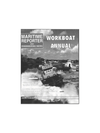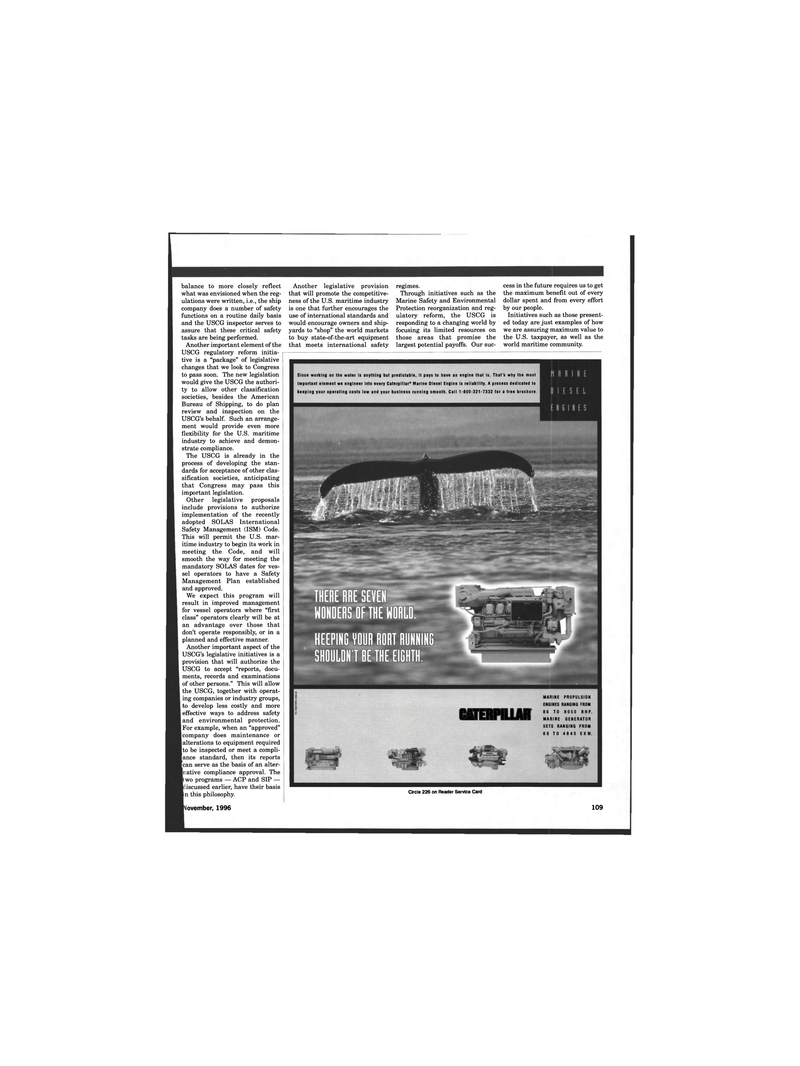
Page 107: of Maritime Reporter Magazine (November 1996)
Read this page in Pdf, Flash or Html5 edition of November 1996 Maritime Reporter Magazine
Since working on the water is anything but predictable, it pays to have an engine that is. That's why the most important element we engineer into every Caterpillar® Marine Diesel Engine is reliability. A process dedicated to keeping your operating costs low and your business running smooth. Call 1-800-321-7332 for a free brochure.
THERE RRE SEVEN
WONDERS OF THE WORLD.
HEEPING YOUR RORT RUNNING
SHOULDN'T BE THE EIGHTH. balance to more closely reflect what was envisioned when the reg- ulations were written, i.e., the ship company does a number of safety functions on a routine daily basis and the USCG inspector serves to assure that these critical safety tasks are being performed.
Another important element of the
USCG regulatory reform initia- tive is a "package" of legislative changes that we look to Congress to pass soon. The new legislation would give the USCG the authori- ty to allow other classification societies, besides the American
Bureau of Shipping, to do plan review and inspection on the
USCG's behalf. Such an arrange- ment would provide even more flexibility for the U.S. maritime industry to achieve and demon- strate compliance.
The USCG is already in the process of developing the stan- dards for acceptance of other clas- sification societies, anticipating that Congress may pass this important legislation.
Other legislative proposals include provisions to authorize implementation of the recently adopted SOLAS International
Safety Management (ISM) Code.
This will permit the U.S. mar- itime industry to begin its work in meeting the Code, and will smooth the way for meeting the mandatory SOLAS dates for ves- sel operators to have a Safety
Management Plan established and approved.
We expect this program will result in improved management for vessel operators where "first class" operators clearly will be at an advantage over those that don't operate responsibly, or in a planned and effective manner.
Another important aspect of the
USCG's legislative initiatives is a provision that will authorize the
USCG to accept "reports, docu- ments, records and examinations of other persons." This will allow the USCG, together with operat- ing companies or industry groups, to develop less costly and more effective ways to address safety and environmental protection.
For example, when an "approved" company does maintenance or alterations to equipment required to be inspected or meet a compli- ance standard, then its reports can serve as the basis of an alter- ative compliance approval. The wo programs — ACP and SIP — iscussed earlier, have their basis n this philosophy.
November, 1996
Another legislative provision that will promote the competitive- ness of the U.S. maritime industry is one that further encourages the use of international standards and would encourage owners and ship- yards to "shop" the world markets to buy state-of-the-art equipment that meets international safety regimes.
Through initiatives such as the
Marine Safety and Environmental
Protection reorganization and reg- ulatory reform, the USCG is responding to a changing world by focusing its limited resources on those areas that promise the largest potential payoffs. Our suc- cess in the future requires us to get the maximum benefit out of every dollar spent and from every effort by our people.
Initiatives such as those present- ed today are just examples of how we are assuring maximum value to the U.S. taxpayer, as well as the world maritime community.
Circle 226 on Reader Service Card 109
MARINE PROPULSION
ENGINES RANGING FROM 85 TO 8050 BHP.
MARINE GENERATOR
SETS RANGING FROM 65 TO 4840 EKW.
CATERPILLAR

 106
106

 108
108
